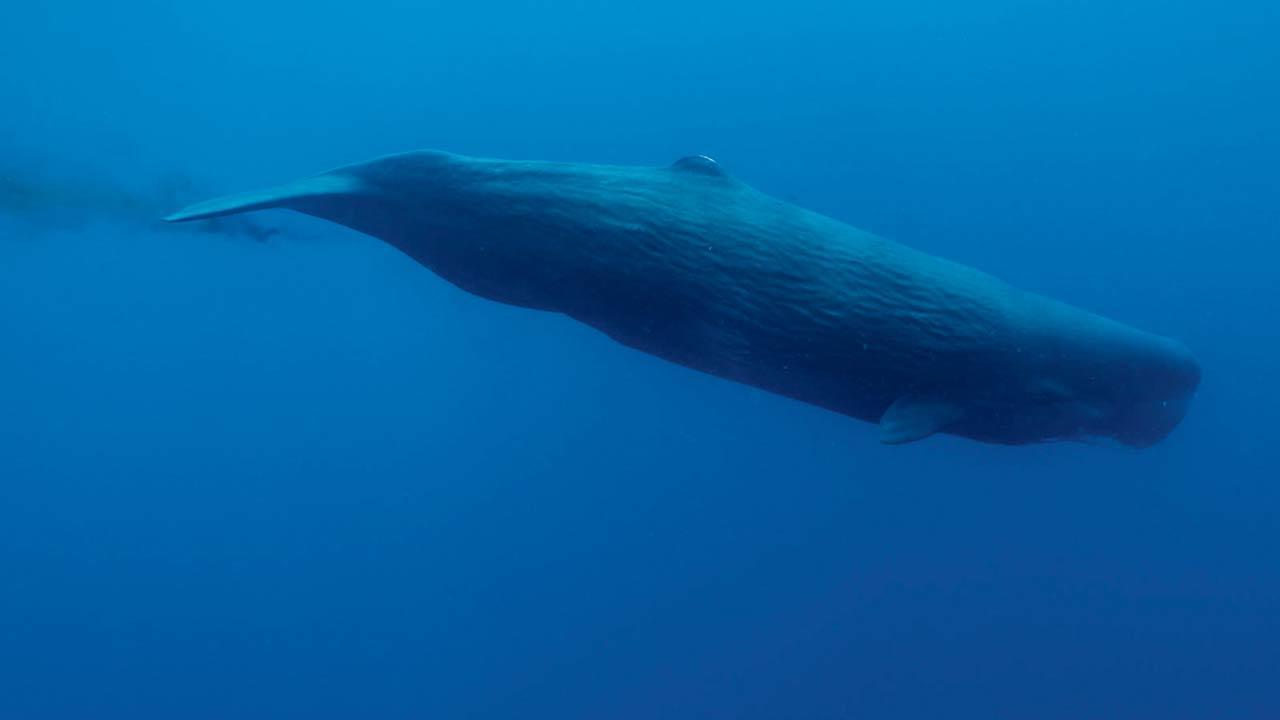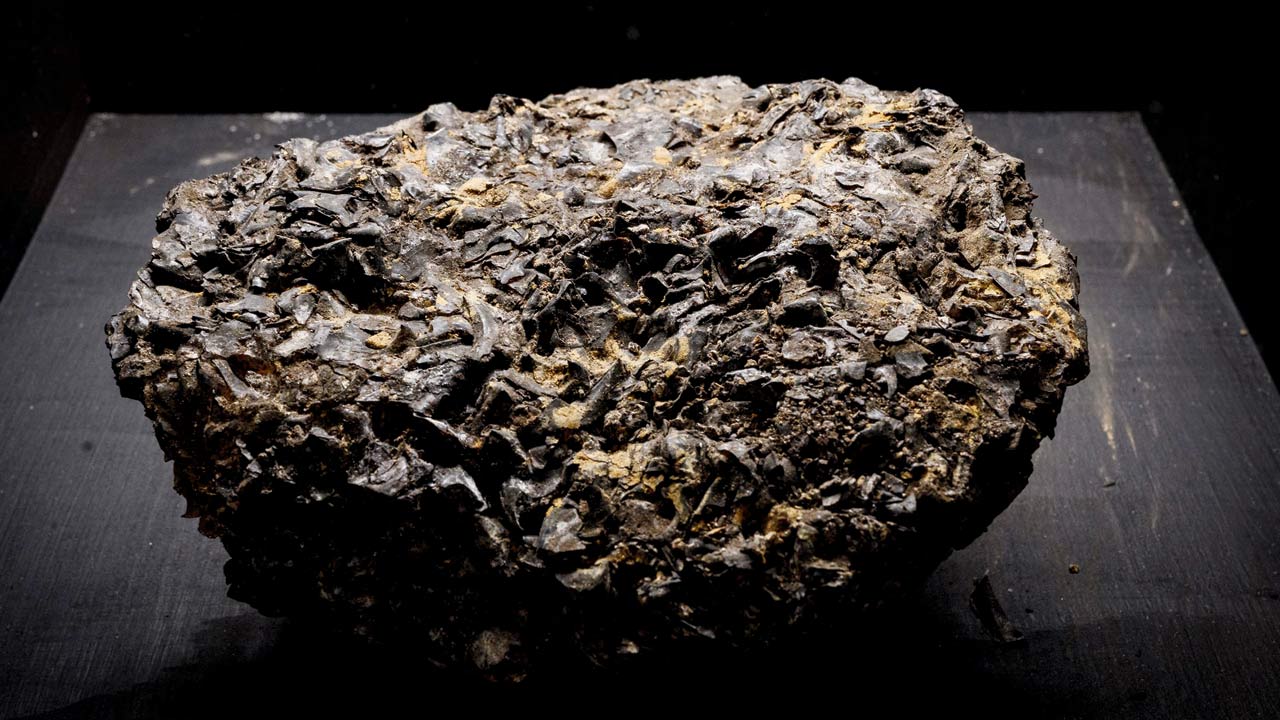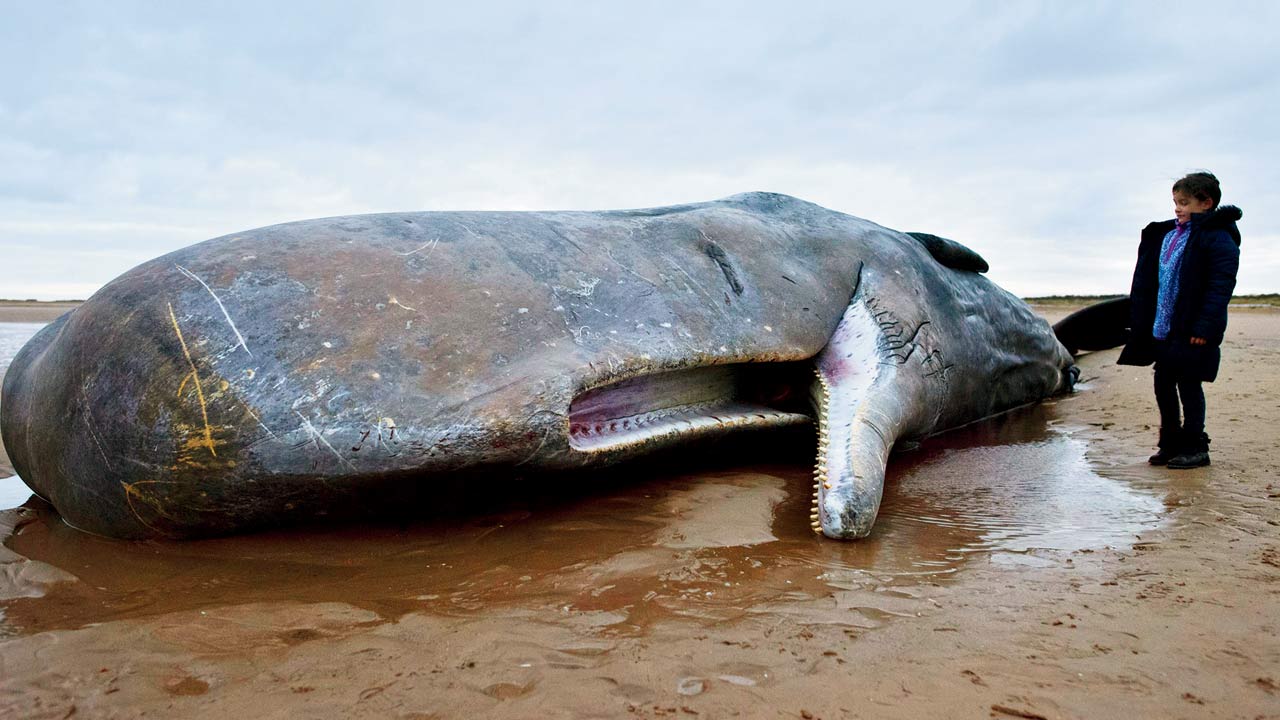The Forest Department and police are in a tizzy over the increasing instances of whale vomit selling illegally for crores. Who is fuelling its sale and why is a product derived without hurting or killing an animal illegal in the first place?

A Sperm Whale defecating in open water, on November 8, 2011, in Mauritius Island, Indian Ocean. The faeces of Sperm Whales contain a solid substance, called ambergris, which has long been used in the constitution of perfumes. Pics/Getty Images
As if coffee connoisseurs paying $200 for 450gm of Kopi Luwak or coffee beans that have passed through the intestine and scent glands before being defecated by the Luwak or Asian Palm Civet, wasn’t enough, Mumbai is now hearing frequent stories about dealers willing to cough up crores for a discharge of another kind.
ADVERTISEMENT
Last week, a joint operation by the Mumbai police and forest department officials led to the seizing of 26 kg of Sperm Whale vomit or ambergris, via two operations and led to the arrest of four people. Rajesh Mistry and Diwakar Shetty and Kititbhai Wadwhana were found with 8 kg of ambergris on July 9. Sayed Simbakthulla from Karnataka, who was lodged at an Andheri location for a month, was also nabbed after the team members approached him as potential buyers. He was found with 18 kg of ambergris. All accused were booked under the Wildlife Protection Act, 1972. The sale of ambergris is prohibited in India since the endangered Sperm is protected under wildlife laws.
 A chunk of ambergris is seen among exhibits during a press preview of the “London: Port City” exhibition at the Museum of London Docklands, on October 21, 2021. Ambergris, a dull grey waxy substance that’s created in the intestine of the Sperm Whale, is sought-after across the world since it is used as a fixative that stabilises the scent of perfumes to make them last longer, and in the manufacture of aphrodisiacs products
A chunk of ambergris is seen among exhibits during a press preview of the “London: Port City” exhibition at the Museum of London Docklands, on October 21, 2021. Ambergris, a dull grey waxy substance that’s created in the intestine of the Sperm Whale, is sought-after across the world since it is used as a fixative that stabilises the scent of perfumes to make them last longer, and in the manufacture of aphrodisiacs products
Ambergris, a dull grey waxy substance that’s created in the intestine of the Sperm Whale, is sought-after across the world since it is used as a fixative that stabilises the scent of perfumes to make them last longer, and in the manufacture of aphrodisiacs products. This has often led wildlife conservationists to demand a ban on the sale of perfumes that use it. It’s for a reason that ambergris is called the treasure of the sea or floating gold.
The now-dying Sperm Whale species consumes cephalods like squid and cuttle fish in large quanities. The indigestible portions are usually ejected from the body as intestinal slurry. Ranging from white to black, it’s the lightest shade of ambergris that sells for the highest amount. While its sale is illegal in India, in the UK, legit transactions are carried out. A British firm named Ambergris Connect Limited claims on its official website to ethically source the slurry from beaches. The price per kg (all samples under 10 grams are made up of small 1-3 gram pieces unless otherwise instructed) at $25 (R1,875 for White), $23 (R1,725 for Brown) and $20(R1500 for Black).
 Kedar Gore and Dipani Sutariya
Kedar Gore and Dipani Sutariya
While some believe its trade in India has picked up in recent times, there are those who disagree. Dipani Sutaria, a marine mammal expert and member, IUCN Cetacean Specialist Group and marine ecologist says that it could be a function of instances being reported more frequently in the media. She argues, “I am not quite sure how one can stop the natural process of a Sperm Whale releasing ambergris. However, I don’t see why the use of biological material obtained without killing or hunting should be stopped. The Wildlife Protection Act is archaic and not nuanced enough to address this particular product. What perhaps is needed is that a fair, non-corrupt system be put in place; whoever finds the ambergris first informs the Forest Department and the government can set a rate for it. Since ambergris is found by luck, its trade should be regulated instead of stopped. Why deny fishing communities their due? On a positive note, the more instances of ambergris we have, the more likelihood that a population of Sperm Whales uses our waters.” Sutaria adds that she found the pictures of the ‘accused’ kneeling around the seized ambergris, their hands tied, disturbing. “Why not go to the end of the supply chain? Why only target suppliers? Why not also go after firms that demand ambergris?”
Well-known wildlife conservationist Kedar Gore, director, The Corbette Foundation, agrees that it’s the perfume industry that should be held accountable. Just like ivory sale and purchase is banned in India, so should that surrounding ambergris for the scents industry. The nabbing of suppliers is only part of the battle won when online sale of ambergris is open and free, he thinks. “I also believe that the authorities should avoid mentioning the market price of seizures done, as this could act as a temptation for people to get involved in its illegal trade given the unemployment created during the pandemic. Taking efforts to raise awareness among the coastal communities about the product and it’s exploitation is also key to addressing the problem. Unless the demand for ambergris is curtailed, it will be difficult to control the supply. Why not rope in celebrities and high net worth individuals to petition perfume users not to buy perfumes from firms that use it?”
 A little girl poses for a photograph next to a Sperm Whale, which died after becoming stranded on a beach in London. The now dying Sperm Whale species consumes cephalods like squid and cuttle fish in large quanities. The indigestible portions are usually ejected from the body as intestinal slurry. Ranging from white to black, it’s the lightest shade of ambergris that sells for the highest amount
A little girl poses for a photograph next to a Sperm Whale, which died after becoming stranded on a beach in London. The now dying Sperm Whale species consumes cephalods like squid and cuttle fish in large quanities. The indigestible portions are usually ejected from the body as intestinal slurry. Ranging from white to black, it’s the lightest shade of ambergris that sells for the highest amount
What could prove useful is to target various sections of the trade network, including fisherfolk. Marine biologist Swapnil Tandel believes the smugglers network could be luring fishermen to make a quick buck. Because the Sperm Whale is the only sub species to produce ambergris, it is under the watch of those who can exploit it.
The creation is a natural process and unique. Killing the species will not benefit traders because it’s only when a Sperm Whale ingests squids with suckers on its tentacles, that it can’t digest, that it ejects the waste from its system, creating whale vomit. Wildlife rescuer and volunteer with Wildlife Crime Control Bureau, Ankit Vyas, says, “Firstly, ambergris cannot be derived by poaching or killing whales. When the refuse is ejected by the whale, it mixes with other particles and minerals in the sea and turns into a waxy substance. One is most likely to come across it from June to September.”
‘Agencies are working in tandem’

Sunil Limaye, Principal Chief Conservator of Forest (PCCF) Wildlife
“The Forest Department along with other enforcement agencies like WCCB, the police, Customs, and Revenue Directorate, is trying to find out where ambergris is being sourced from. We need stricter laws. An advisory has been sent out to alert people about its illegal sale and what to do in case they comes across information on its trade.”
The Sperm Whale
Sperm Whale or cachalot is the largest of the toothed whales and the largest toothed predator. It is the only living member of the genus Physeter and one of three extant species in the Sperm Whale family, along with the Pygmy Sperm Whale and Dwarf Sperm Whale of the genus Kogia. It weighs 14,000 kg to 41,000 kg. In India, it’s protected under Schedule 1 of Wildlife Protection Act, 1972.
 Subscribe today by clicking the link and stay updated with the latest news!" Click here!
Subscribe today by clicking the link and stay updated with the latest news!" Click here!








